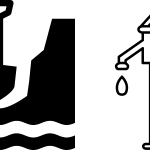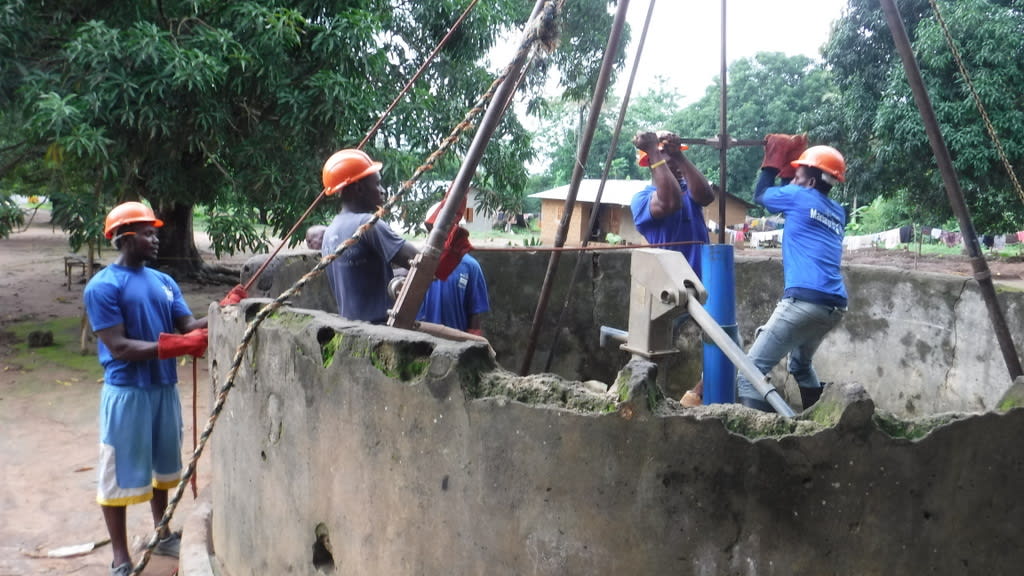Yaliba Village is a rural area full of the daily sounds of passing cars and motorcycles. A busy road goes through the village with homes lined up on either side. The houses are surrounded by large trees that overhang and create a shady and cool atmosphere.
The most common livelihood in this village is processing salt from the sand that is collected when the tide recedes daily. The sand is then soaked and filtered and heated on a large metal pan. The water is then heated in three separate metal pans with each containing the liquid salt. Each pan is placed under a large fire and pan one is transferred to pan two and pan two is transferred to pan three. The process is repeated until the salt has attained its pure white color. The planting of fruits and vegetable is done on a smaller scale for the consumption of households. There are also some men who work in the stone mines and other people who engage in petty trading.
In the dry season, the houses are extremely hot and humid inside, so people find peace and comfort under large trees.
All hours of the day, children and adults are found under the trees doing different things. The women use the time under the large trees to create a special bond with their daughters. The men gather to play checkers and the women are more engaged in activities such as hair braiding. The buildings are made of mud blocks with cement plastering and roofing zinc. The back yards are lined with kitchens and the homes that have latrines are a distance off.
The dry season also causes water problems for people in Yaliba Village.
The water at the protected water well is in very low supply and goes dry for up to three months during the dry season. The little water that is available during the dry season is rationed so everyone in the community can have at least a little bit. But that means that people must also turn to other sources to meet their daily water needs.
The nearest alternative source is the open swamp. The only time the water at the swamp is used is during the worst part of the dry season. The water from the swamp is fetched and kept for a long period of time in hopes that the dirt and milky color settles to the bottom of the container. But that is not the greatest concern. Being an open source, the water from the swamp is highly contaminated, which makes it unsafe for drinking.
Here’s what we’re going to do about it:
Well Rehabilitation
The well marked for this overhaul is dry for three months every year and needs major work to supply adequate, clean water to the community year round. The pump will be removed, and a hand auger will be lowered inside and powered by a drill team. This hand auger will allow the team to drill several meters deeper to hit a sufficient water column that will ensure the well supplies water throughout all seasons.
As the team drills, casing will be installed, transforming the bottom of this hand-dug well into a borehole. PVC piping will connect this lower system directly to the pump, a construction that we know will also improve the quality of water.
Once this plan is implemented, everyone within the community will have access to safe drinking water in both quality and quantity, even through the dry months.
The water point is going to be open to the whole village with no bias or preferential treatment given to any one person regardless of status or government affiliation. Every body is an equal owner of the water well and is equally responsible for the proper monitoring. There will be no rationing but the water user committee is at liberty to set guidelines to make sure the pump is not abused or mismanaged. Therefore there might be hours set aside to make sure the well is cleaned, so maybe some time during the day or night the water point might be closed.
Hygiene and Sanitation Training
There will be hygiene and sanitation training sessions offered for three days in a row.
No handwashing stations were observed here. After our visit, the hygiene and sanitation trainer decided it would be best to teach community members how to build a tippy tap (a hand-washing station built with a jerrycan, string, and sticks). They will use these tippy taps for handwashing demonstrations, and will also teach about other tools like dish racks and the importance of properly penning in animals.
These trainings will also strengthen the water user committee that manages and maintains this well. They enforce proper behavior and report to us whenever they need our help solving a serious problem, like a pump breakdown.































